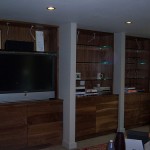This guest post was contributed by Jenny Wadlow.
In many ways the internet is incredibly ubiquitous and moreso than we could possibly have predicted when it was first invented. These days we have internet on our phones, on our laptops and some of us even have it on our watches and in our glasses. It seems there’s no escaping the ‘web’ these days, but if you think that it’s ever present now, then just wait a decade or so and see where we are then. Consider this the early days of the web still, pretty soon we’re going to see an explosion that absolutely changes the way we do everything. Read on to find out how I can be so sure of that, and to see some of the exciting ways it might integrate itself further into our lives.
Why the Internet is About to Go Big
 The only reason that you currently have the luxury of ‘internet in your pocket’, is that the technology has become small enough and cheap enough to make that possible. The reason we can be confident that the web is going to find its way into even more devices then, is simply that technology always gets progressively smaller and more cost-effective. And as connection speeds get faster, we’ll eventually get to the point where ‘cloud computing’ is standard. That will mean that your device doesn’t have a powerful processor at all, but rather just a strong always-on internet connection that connects it to a server where the heavy computation will take place. Your phone can then be any size and will barely cost you anything, but you will be able to do anything you want on it because it will simply be a portal to a more powerful system on the cloud.
The only reason that you currently have the luxury of ‘internet in your pocket’, is that the technology has become small enough and cheap enough to make that possible. The reason we can be confident that the web is going to find its way into even more devices then, is simply that technology always gets progressively smaller and more cost-effective. And as connection speeds get faster, we’ll eventually get to the point where ‘cloud computing’ is standard. That will mean that your device doesn’t have a powerful processor at all, but rather just a strong always-on internet connection that connects it to a server where the heavy computation will take place. Your phone can then be any size and will barely cost you anything, but you will be able to do anything you want on it because it will simply be a portal to a more powerful system on the cloud.
This then means that anything with a display and a wireless connection will be able to handle any intensive computational processes, which means that manufacturers will be able to give almost any item connection to the web. This will result in what is known as the ‘internet of things’, where everything in your home has the ability to communicate with everything else. Your fridge will be able to tell you how much milk you have left (and place orders for more if you want it to), and your ink pen will be able to remember everything that you write and save it to the cloud.
Augmented Reality
 At this point, augmented reality will no longer be an exciting ‘buzz word’ but rather a seamless integration of technology and real-world devices that we will come to expect. A pen that remembers what you write will be augmented reality, but not in the ‘in-your-face’ way that we’ve come to expect thanks to films like Minority Report.
At this point, augmented reality will no longer be an exciting ‘buzz word’ but rather a seamless integration of technology and real-world devices that we will come to expect. A pen that remembers what you write will be augmented reality, but not in the ‘in-your-face’ way that we’ve come to expect thanks to films like Minority Report.
Anywhere you look then, you’ll be able to get up-to-date information immediately and elegantly. Everything will be customisable, and smart sensors will ensure you never need to worry about the temperature of the volume again. And nowhere will this be truer than around the home.
The Automated Smart Home
 A window for instance will no longer just be a piece of glass, but rather a monitor and an input device. The positioning for instance will make your window perfect for showing you information such as the time and the temperature, while you’ll probably also be able to do things like take snapshots of the view just by swiping the screen. When you turn on the TV, the windows will automatically black out all light allowing you to see the screen free of glare, or alternatively they could even become the TV screen meaning you don’t have to have an ugly black box in your living room.
A window for instance will no longer just be a piece of glass, but rather a monitor and an input device. The positioning for instance will make your window perfect for showing you information such as the time and the temperature, while you’ll probably also be able to do things like take snapshots of the view just by swiping the screen. When you turn on the TV, the windows will automatically black out all light allowing you to see the screen free of glare, or alternatively they could even become the TV screen meaning you don’t have to have an ugly black box in your living room.
Windows of the future will be able to detect how much light is in the room, and let in as much or as little from outside in the same manner of a thermostat to maintain the exact light levels that you prefer. You’ll be able to change the view, your kids will be able to run paint programs by drawing onto the glass, and you’ll have no need for things like CCTV seeing as the windows will have it built in.
Though the internet is going to take over everything we do then, the brilliance of it will be the way that no one notices. It will blend into the background and handle jobs without needing to ask, and the result will be a more minimalist, a more automated and a smarter home.
Author Bio
Jenny Wadlow, the author of this post is a freelancer, currently working for Vinyl City, a company with over 20 years of experience in construction and remodeling. She enjoys writing about her experiences and sharing useful information through her articles.